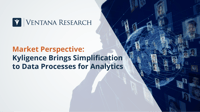Data platforms are designed to manage and analyze big data, enabling organizations to leverage their data to operate with greater efficiency across on-premises, hybrid and multi-cloud environments. Our Analytics and Data Benchmark Research finds that while 58% are using big data in their analytics processes, less than one quarter (23%) are satisfied with their technology’s support for big data. Looking at the statistics, it is safe to say that organizations have been slow to adopt modern...
Read More
Topics:
Data Governance,
Data Integration,
Data,
data lakes,
Streaming Data,
data operations,
Data Platforms
The virtualization of business and the evolution of digital transformation to applications and systems that operate in cloud computing — or the “as-a-service” environment — has fragmented enterprise and data architectures. The role of cloud computing has become a utility to provide elastic resources in support of operational needs. For example, data in the cloud requirements are provided by third-party vendors, managing security and storage of data outside the organization.
Read More
Topics:
Cloud Computing,
Data,
Digital Technology,
Digital transformation,
data lakes,
data operations,
AI & Machine Learning,
Digital Business,
Data Platforms


